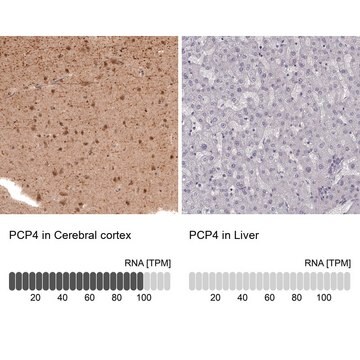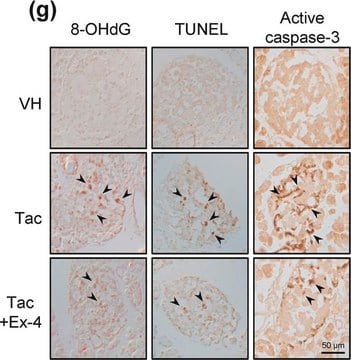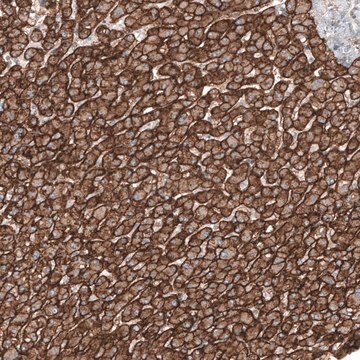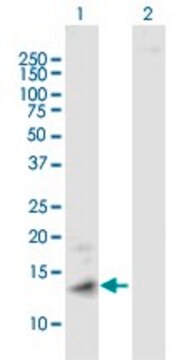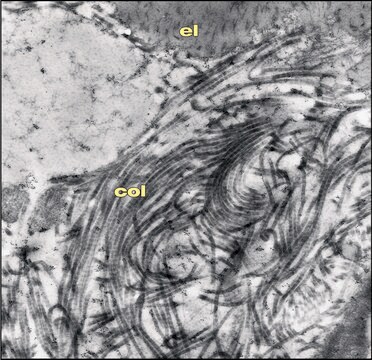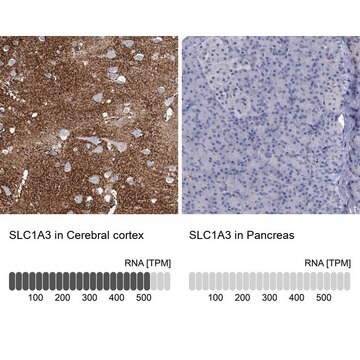HPA004011
Anti-MT3 antibody produced in rabbit

Prestige Antibodies® Powered by Atlas Antibodies, affinity isolated antibody, buffered aqueous glycerol solution
别名:
Anti-GIF, Anti-GIFB, Anti-Growth inhibitory factor, Anti-MT-3, Anti-MT-III, Anti-Metallothionein-3, Anti-Metallothionein-III
登录查看公司和协议定价
所有图片(5)
About This Item
推荐产品
生物源
rabbit
品質等級
共軛
unconjugated
抗體表格
affinity isolated antibody
抗體產品種類
primary antibodies
無性繁殖
polyclonal
產品線
Prestige Antibodies® Powered by Atlas Antibodies
形狀
buffered aqueous glycerol solution
物種活性
human
加強驗證
orthogonal RNAseq
Learn more about Antibody Enhanced Validation
技術
immunohistochemistry: 1:50- 1:200
免疫原序列
MDPETCPCPSGGSCTCADSCKCEGCKCTSCKKSCCSCCPAECEKCAKDCVCKGGEAAEAEAEKCS
UniProt登錄號
應用
research pathology
運輸包裝
wet ice
儲存溫度
−20°C
目標翻譯後修改
unmodified
基因資訊
human ... MT3(4504)
免疫原
Metallothionein-3 recombinant protein epitope signature tag (PrEST)
應用
All Prestige Antibodies Powered by Atlas Antibodies are developed and validated by the Human Protein Atlas (HPA) project and as a result, are supported by the most extensive characterization in the industry.
The Human Protein Atlas project can be subdivided into three efforts: Human Tissue Atlas, Cancer Atlas, and Human Cell Atlas. The antibodies that have been generated in support of the Tissue and Cancer Atlas projects have been tested by immunohistochemistry against hundreds of normal and disease tissues and through the recent efforts of the Human Cell Atlas project, many have been characterized by immunofluorescence to map the human proteome not only at the tissue level but now at the subcellular level. These images and the collection of this vast data set can be viewed on the Human Protein Atlas (HPA) site by clicking on the Image Gallery link. We also provide Prestige Antibodies® protocols and other useful information.
The Human Protein Atlas project can be subdivided into three efforts: Human Tissue Atlas, Cancer Atlas, and Human Cell Atlas. The antibodies that have been generated in support of the Tissue and Cancer Atlas projects have been tested by immunohistochemistry against hundreds of normal and disease tissues and through the recent efforts of the Human Cell Atlas project, many have been characterized by immunofluorescence to map the human proteome not only at the tissue level but now at the subcellular level. These images and the collection of this vast data set can be viewed on the Human Protein Atlas (HPA) site by clicking on the Image Gallery link. We also provide Prestige Antibodies® protocols and other useful information.
生化/生理作用
Metallothionein 3 (MT3) is regulated in the non-amyloidogenic pathway to generate soluble APPa (sAPPa). It increases the activity of ADAM10. This gene possesses cell growth inhibitory activity and its upregulation can inhibit esophageal cancer cell proliferation and induce apoptosis, which may be achieved by blocking the tumor cell growth cycle. It is an androgen-upregulated gene that promotes tumorigenesis of prostate carcinoma cells. It expression may have an impact on the pathogenesis of NSCLC. It is highly expressed in the normal human brain and is down-regulated in Alzheimer disease.
特點和優勢
Prestige Antibodies® are highly characterized and extensively validated antibodies with the added benefit of all available characterization data for each target being accessible via the Human Protein Atlas portal linked just below the product name at the top of this page. The uniqueness and low cross-reactivity of the Prestige Antibodies® to other proteins are due to a thorough selection of antigen regions, affinity purification, and stringent selection. Prestige antigen controls are available for every corresponding Prestige Antibody and can be found in the linkage section.
Every Prestige Antibody is tested in the following ways:
Every Prestige Antibody is tested in the following ways:
- IHC tissue array of 44 normal human tissues and 20 of the most common cancer type tissues.
- Protein array of 364 human recombinant protein fragments.
聯結
Corresponding Antigen APREST86677
外觀
Solution in phosphate-buffered saline, pH 7.2, containing 40% glycerol and 0.02% sodium azide
法律資訊
Prestige Antibodies is a registered trademark of Merck KGaA, Darmstadt, Germany
免責聲明
Unless otherwise stated in our catalog or other company documentation accompanying the product(s), our products are intended for research use only and are not to be used for any other purpose, which includes but is not limited to, unauthorized commercial uses, in vitro diagnostic uses, ex vivo or in vivo therapeutic uses or any type of consumption or application to humans or animals.
未找到合适的产品?
试试我们的产品选型工具.
儲存類別代碼
10 - Combustible liquids
水污染物質分類(WGK)
WGK 1
閃點(°F)
Not applicable
閃點(°C)
Not applicable
個人防護裝備
Eyeshields, Gloves, multi-purpose combination respirator cartridge (US)
Z Q Tian et al.
Genetics and molecular research : GMR, 12(4), 4595-4603 (2013-11-14)
Metallothionein (MT)-3 has cell growth inhibitory activity, and is the only currently known MT subtype with unique physiological functions. The expression levels of MT-1E, a subtype of MT-1, were positively correlated with the degree of esophageal cancer malignancy. The present
Bong Hwan Park et al.
FEBS letters, 588(14), 2294-2300 (2014-05-27)
A-disintegrin and metalloproteinase 10 (ADAM10) is involved in the generation of amyloid-β (Aβ) during amyloid precursor protein (APP) processing, and has a protective effect against Aβ neurotoxicity. We explored how metallothionein-III (MT-III) is regulated in the non-amyloidogenic pathway to generate
Lydia Alvarez et al.
The Journal of biological chemistry, 287(34), 28456-28469 (2012-06-23)
We examined the profiling of gene expression of metallothioneins (MTs) in human tissues from cadaver eyes with microarray-based analysis. All MT1 isoforms, with the exception of MT1B, were abundantly expressed in lens and corneal tissue. Along with MT1B, MT4 was
Horng-Heng Juang et al.
The Prostate, 73(14), 1495-1506 (2013-06-25)
Metallothioneins (MT1, MT2, MT3, and MT4) are regarded as modulators regulating a number of biological processes including cell proliferation, differentiation, and invasion. We determined the effects of androgen, cadmium, and arsenic on MT1/2 and MT3 in prostate carcinoma cells, and
Bozena Werynska et al.
Anticancer research, 33(3), 965-974 (2013-03-14)
Currently, there is little knowledge concerning expression of metallothionein-III (MT-III), also known as growth-inhibitory factor, in non-small cell lung cancer (NSCLC). In this study, we evaluated MT-III expression in 184 patients using immunohistochemistry and in 61 cases using real-time polymerase
我们的科学家团队拥有各种研究领域经验,包括生命科学、材料科学、化学合成、色谱、分析及许多其他领域.
联系技术服务部门